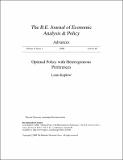| dc.contributor.author | Kaplow, Louis | |
| dc.date.accessioned | 2014-06-17T16:08:23Z | |
| dc.date.issued | 2008 | |
| dc.identifier.citation | Louis Kaplow, Optimal Policy with Heterogeneous Preferences, 8 B. E. J. Econ. Analysis & Pol'y 40 (2008). | en_US |
| dc.identifier.issn | 1935-1682 | en_US |
| dc.identifier.uri | http://nrs.harvard.edu/urn-3:HUL.InstRepos:12330894 | |
| dc.description.abstract | Optimal policy rules—including those regarding income taxation, commodity taxation, public goods, and externalities—are typically derived in models with homogeneous preferences. This article reconsiders many central results for the case in which preferences for commodities, public goods, and externalities are heterogeneous. When preference differences are observable, standard second-best results in basic settings are unaffected, except those for the optimal income tax. Optimal levels of income taxation may be higher, the same, or lower on types who derive more utility from various goods, depending on the nature of preference differences and the concavity of the social welfare function. When preference differences are unobservable, all policy rules may change. The determinants of even the direction of optimal rule adjustments are many and subtle. | en_US |
| dc.language.iso | en_US | en_US |
| dc.publisher | Berkeley Electronic Press | en_US |
| dc.relation.isversionof | doi:10.2202/1935-1682.1947 | en_US |
| dash.license | LAA | |
| dc.subject | heterogeneous preferences | en_US |
| dc.subject | optimal income taxation | en_US |
| dc.subject | commodity taxation | en_US |
| dc.subject | externalities | en_US |
| dc.subject | public good | en_US |
| dc.subject | social welfare | en_US |
| dc.title | Optimal Policy with Heterogeneous Preferences | en_US |
| dc.type | Journal Article | en_US |
| dc.description.version | Version of Record | en_US |
| dc.relation.journal | B. E. Journal of Economic Analysis and Policy | en_US |
| dash.depositing.author | Kaplow, Louis | |
| dc.date.available | 2014-06-17T16:08:23Z | |
| dc.identifier.doi | 10.2202/1935-1682.1947 | * |
| dash.contributor.affiliated | Kaplow, Louis | |


